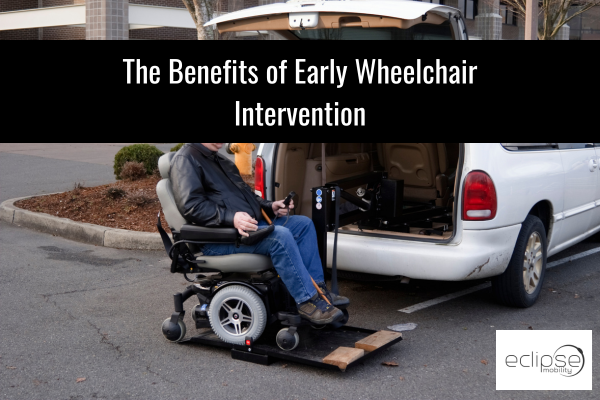Early wheelchair intervention (EWI) is the timely provision of a wheelchair to a person who needs it, along with comprehensive wheelchair assessment, training, and ongoing support.

This approach stands in contrast to delayed wheelchair provision, which can have a number of negative consequences.
The Importance of Early Intervention
There is a growing body of research that highlights the significant benefits of early wheelchair intervention. These benefits can be categorized into several key areas:
-
Improved Physical Health: Early access to a properly fitted wheelchair can help to prevent secondary complications associated with mobility limitations. This includes pressure injuries, pain, contractures (muscle shortening), and cardiovascular complications. Proper positioning in a wheelchair can help to maintain good posture, distribute weight evenly, and reduce the risk of pressure sores. Early use of a wheelchair can also improve circulation and lung function.
-
Enhanced Participation: Wheelchairs empower individuals to participate more actively in daily life. With a wheelchair, people can engage in work, education, social activities, and leisure pursuits. This increased participation can lead to improved self-esteem, social integration, and a better quality of life.
-
Psychological Well-being: Early wheelchair intervention can help to prevent feelings of isolation and depression that can sometimes accompany mobility limitations. By promoting independence and participation, EWI can boost self-confidence and foster a more positive self-image.
-
Developmental Benefits: For children with mobility limitations, early access to a wheelchair can be critical for healthy development. Wheelchairs allow children to explore their environment, interact with peers, and participate in play activities. This can have a significant impact on their cognitive, social, and emotional development.
Addressing Common Concerns About Early Wheelchair Intervention
Some people may have concerns about the potential drawbacks of early wheelchair use. However, the research suggests that these concerns are generally unfounded. For example, there is no evidence that early wheelchair use leads to muscle weakness or a decrease in motivation to walk. In fact, early intervention can help to improve a person’s overall physical fitness and function.
Another concern is that wheelchairs may become a crutch, discouraging people from attempting to walk. However, EWI does not preclude physical therapy or other interventions aimed at improving walking ability. In fact, early wheelchair use can sometimes make it easier for people to participate in gait training and other therapies.
The EWI Process
Early wheelchair intervention is a collaborative process that involves a team of healthcare professionals, including physiatrists, occupational therapists, physical therapists, and wheelchair seating specialists. The process typically involves the following steps:
- Assessment: A comprehensive assessment is conducted to determine the individual’s specific needs and goals. This assessment will consider the person’s medical condition, functional abilities, lifestyle, and environment.
- Wheelchair Selection: Based on the assessment, a wheelchair is selected that meets the individual’s unique needs. This may involve a custom-made wheelchair or a prefabricated model with modifications.
- Training: The individual is provided with training on how to safely and effectively use their wheelchair. This includes instruction on proper positioning, transfers, propulsion techniques, and obstacle negotiation.
- Ongoing Support: EWI is an ongoing process that includes regular follow-up appointments to ensure that the wheelchair continues to meet the individual’s needs. This may involve adjustments to the wheelchair, additional training, or support with troubleshooting any challenges that arise.
Social and Economic Implications of EWI
In addition to the physical and psychological benefits, EWI can also have significant social and economic implications.
Social Benefits
- Increased Social Inclusion: Wheelchairs can be powerful tools for social inclusion. By providing individuals with the mobility they need to participate in community activities, EWI can help to break down barriers and promote social integration. This can lead to increased social interaction, reduced feelings of isolation, and a stronger sense of belonging.
- Improved Quality of Life: In addition to the physical and psychological benefits, EWI can also lead to an improved quality of life. By providing individuals with the freedom and independence they need to participate in daily activities, wheelchairs can make a significant difference in their overall well-being.
- Empowerment and Self-Determination: EWI can empower individuals with disabilities to make their own choices and live their lives on their own terms. By providing them with the tools they need to be independent, EWI can help them to achieve their goals and live fulfilling lives.
Economic Benefits
- Increased Productivity: EWI can help to increase the productivity of individuals with disabilities. By providing them with the mobility they need to get to and from work, wheelchairs can help them to maintain their employment and contribute to the economy.
- Reduced Healthcare Costs: Early intervention can help to reduce healthcare costs in the long run. By preventing secondary complications such as pressure injuries and contractures, EWI can help to keep individuals healthy and out of the hospital.
- Increased Economic Participation: EWI can help to increase the economic participation of individuals with disabilities. By providing them with the tools they need to be independent and productive, EWI can help to close the gap between people with and without disabilities.
Looking for a Custom Power and Manual Wheelchair?
The Role of Technology
In recent years, there have been significant advances in wheelchair technology. This includes the development of powered wheelchairs, smart wheelchairs, and other innovative devices. These technologies can provide individuals with even greater levels of independence and control.
- Powered Wheelchairs: Powered wheelchairs can help individuals to navigate challenging terrain and overcome obstacles.
- Smart Wheelchairs: Smart wheelchairs can be equipped with sensors and GPS technology, allowing users to navigate their environment more easily and safely.
The Future of EWI
As wheelchair technology continues to evolve, so too will the benefits of early intervention. In the future, we can expect to see even more innovative and effective interventions that will help individuals with disabilities to live full and productive lives.
Conclusion
Early wheelchair intervention (EWI) offers a multitude of benefits for individuals with mobility limitations. By providing timely access to appropriate wheelchairs, along with comprehensive assessment, training, and ongoing support, EWI can significantly improve physical health, enhance participation in daily life, and promote overall well-being. Furthermore, EWI can lead to increased social inclusion, improved quality of life, and enhanced economic participation. As wheelchair technology continues to advance, we can expect to see even more innovative and effective interventions that will empower individuals with disabilities to live full and productive lives.
If you are considering early wheelchair intervention for yourself or a loved one, Eclipse Mobility can help. Eclipse Mobility is a leading provider of wheelchairs and other mobility products. They offer a wide selection of wheelchairs to choose from, as well as expert assessment, training, and support services. Visit their website to learn more about how Eclipse Mobility can help you achieve your mobility goals.

